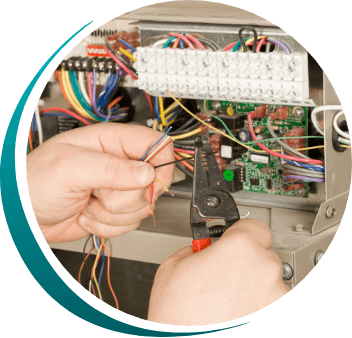When cold weather arrives, you don’t want to call for furnace repair in Rock Hill, SC. Like any appliance, your furnace needs maintenance eventually. The pilot light might go out, or the heat exchanger can crack, among other issues. To tackle these problems, call Arce Heating & AC for furnace service.
Furnace Repair in Rock Hill, SC
For maintenance plan members


Furnace Service in Rock Hill
Even if you replace your filters regularly, your furnace experiences wear and tear during operation. Sometimes, all you need for furnace service is to replace the flame sensor. Other times, the issue might be a cracked heat exchanger, not the flame sensor.
- Flame sensor
- Ductwork
- Heat exchanger
- Gas supply (in the case of gas furnaces)
- Heating element (in the case of electric furnaces)
- Pilot light
- Heat shield
If you have a cracked heat exchanger, as mentioned above, furnace service becomes even more essential. Carbon monoxide can escape from the exhaust and enter your home, posing a serious hazard to your health and increasing the risk of fire. If you feel dizzy or faint, leave your home immediately, call emergency services, and then call us.
Gas furnaces rely on pilot flames to activate the flame sensor, which tells the furnace when to ignite or stop. A sensor that fails to detect flames can shut down the system, leaving you cold. Conversely, a sensor that incorrectly believes the flames are always present can lead to excessive gas being released. Additionally, malfunctions may cause the flame to remain on, potentially cracking the heat exchanger and causing a fire.
Furnace repair service not only keeps you safe but also helps you save money. A malfunctioning component can create further issues. For instance, replacing a dirty air filter reduces the chances of damage to the fan or heat exchanger. Addressing these problems early prevents larger-scale repairs and reduces your overall costs.
When your electric furnace stops heating properly, we are here to help. Our team diagnoses issues such as faulty heating elements, broken thermostats, and damaged sequencers. We quickly and safely restore your system’s performance.
Having technicians from Arce Heating & AC perform furnace service can prevent more drastic repairs and save you energy. The more a furnace struggles to heat your home, the more fuel or electricity it consumes, which increases your utility bills.
For example, if your pressure sensor develops a problem, it might mislead your system. Operating a furnace under incorrect pressure means you’ll receive less hot air where you need it, causing the furnace to work harder to compensate and ultimately driving up your bills.
Friendly Furnace Repair Service
Arce Heating & AC has provided friendly and dependable furnace repair service to Rock Hill for over a decade. This means we’ve encountered numerous furnace issues over the years.
It also means that we’re not afraid to perform furnace repairs for you. From misfiring pilot lights to heat shield problems, we’ll keep you warm. We strive to be trustworthy, and our A+ BBB rating proves it.
For the best furnace repair service in Rock Hill, reach out to us at Arce Heating & AC today.
Explore all of our other professional HVAC services!
Furnace Repair in Rock Hill: Quick Wins and Long-Term Fixes
Basic checks can speed up a repair visit. Verify the thermostat is set to Heat, replace a clogged filter, and make sure registers are open. Persistent issues like repeated shutdowns, loud rattling, or a burner that will not stay lit call for professional diagnostics to protect your equipment and indoor air.
A precise inspection can pinpoint faults with flame sensors, pressure switches, blower motors, or controls. If your system is nearing the end of its service life or facing major component failures, weighing repair versus replacement can help you plan with confidence.
- Prevent repeat issues with scheduled Rock Hill furnace maintenance.
- Rule out control problems or upgrade comfort with thermostat services.
- When replacement offers better value, review options on our Rock Hill furnace installation page.
Clear testing and straight answers get your heat back safely and efficiently.
©2026 Arce Heating & AC. All Rights Reserved. License: SC - # M114622 | NC - # L35568. Privacy Policy. Web Design and Internet Marketing by RYNO Strategic Solutions